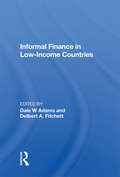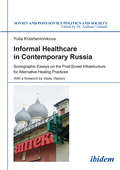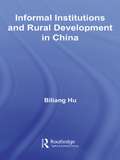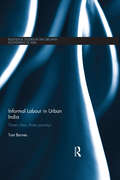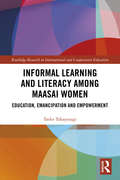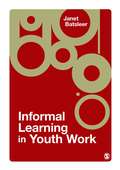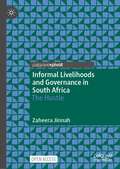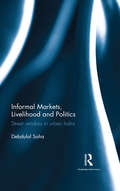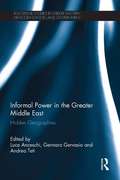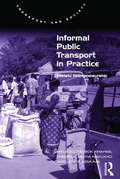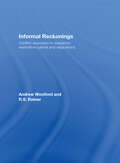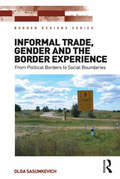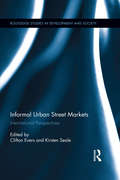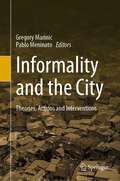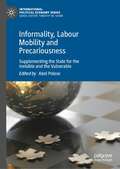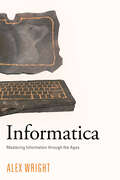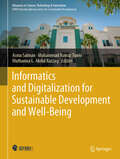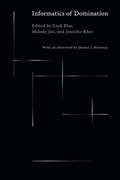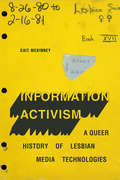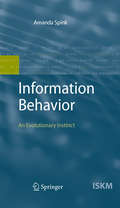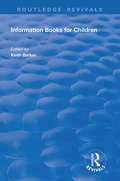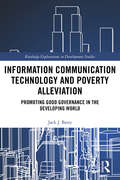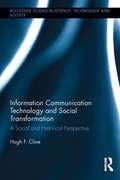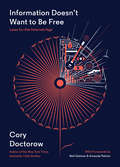- Table View
- List View
Informal Finance In Low-income Countries
by Dale W Adams Delbert A. FitchettInvisible to official statistics and operating outside the reach of governmental regulation, informal finance markets often prove more efficient and more fair than their formal counterparts. The authors of these studies emphasize the diversity and richness of informal credit markets.
Informal Healthcare in Contemporary Russia: Sociographic Essays on the Post-Soviet Infrastructure for Alternative Healing Practices (Soviet and Post-Soviet Politics and Society #165)
by Yulia KrasheninnikovaThis volume deals with one of the most understudied aspects of everyday life in Russian society. Its main characters are the providers of goods and services to whom people turn for healthcare instead of official medical institutions. This encompasses a wide range of actors—from network marketing companies to 'folk' journals on health as well as healers, complementary medicine specialists, and religious organizations.Krasheninnikova's investigation pays particular attention to the legal, social, and economic status of informal healthcare providers. She demonstrates that these agents tend to flourish in bigger towns rather than in small settlements, where public healthcare is lacking. She also emphasizes the flexibility of boundaries between formal and informal healthcare due to the evolution of rules and regulations. The study reveals the important role of institutions that are generally not connected to alternative medicine, such as pharmacies, libraries, and church shops. This book is based on rich empirical observations and avoids both positive and critical assessment of the analyzed phenomena. The result is a vivid and thorough introduction to the world of self-medication and alternative healing in contemporary Russia.
Informal Institutions and Rural Development in China (Routledge Studies on the Chinese Economy)
by Biliang HuProviding an account of the role of informal institutions in Chinese rural development, this book, based on a decade of fieldwork of village life in the Chinese countryside, puts forth a distinctive argument on a very important topic in Chinese economic and social affairs. Focusing in particular on three major informal institutions: village trust and Rotating Savings and Credit Associations (ROSCAs), guanxi community and Integrating Village with Company (IVWC) governance, it argues that informal institutions, traditions and customs are all critical factors for facilitating modernization and social and economic development, promoting the integration of trust, reciprocity, responsibility and obligation into economic and social exchange processes and considerably lowering risks and transactions costs. This detailed account is an invaluable resource for postgraduates and researching studying and working in this area. Winner of the 2008 Zhang Peigang Development Economics Award.
Informal Labour in Urban India: Three Cities, Three Journeys (Routledge Studies in the Growth Economies of Asia)
by Tom BarnesDuring the last two decades, rapid economic growth and development in India has been based upon the mass employment of informal labour. Using case studies from three urban regions, this book examines this growth in modern India’s cities and towns. It argues that India has undergone a process of uneven and combined development during its integration with the world economy, leading to a distorted form of urban development. This book is about work and resistance in India’s massive ‘informal economy’. It looks at the growth of informal labour in Bangalore, Mumbai and New Delhi during an era of neoliberal economic policymaking. Going beyond mainstream accounts, it argues that India’s rapid economic development has been based upon the mass employment of workers on low wages who lack basic social protection and rights at work. It discusses how urban development in India is characterised by a combination of industrialisation, industrial relocation, restructuring and informalisation. Departing from some existing studies of de-industrialisation, it re-frames informalisation as a process that complements, rather than contradicts, contemporary industrialisation in rapidly-emerging economies. The book adopts a ‘classes of labour’ approach, classifying each case of informal labour as a specific ‘form of exploitation’: as a different way for employers to lower production costs, control workers and increase enterprise flexibility. Offering a critique of existing data on the measurement and monitoring of informal labour and employment, the book is relevant to students and scholars of Development Studies, International Political Economy and South Asian Studies.
Informal Learning and Literacy among Maasai Women: Education, Emancipation and Empowerment (Routledge Research in International and Comparative Education)
by Taeko TakayanagiInformal Learning and Literacy among Maasai Women highlights the importance and role of informal education in the emancipation and development of Maasai village women in Kenya. At present, knowledge and research on the impact of informal learning and literacy on community development is limited, and there is a gap between policy level discussions and women’s lived experiences. Using a postcolonial feminist framework, this book sets out to examine linkages between informal learning and literacy, human development and gender inequality. Despite improvements in recent years, access to traditional education remains restricted for many women in rural communities across Kenya. Takayangi’s book is the first to introduce how Maasai village women utilise informal learning and literacy for collective empowerment as well as to sustain their own well-being and that of their families. It presents the perspectives of both local women and institutions and argues that women’s learning is most effective when located within their own socio-cultural and political discourses, and when their voices are listened to and heard. This ethnographic research study is a valuable resource that will contribute to the knowledge of literacy from both theoretical and practical perspectives. It is an essential read for those studying or researching information education, development studies and gender, or education, as well as for teachers, community leaders and aid workers.
Informal Learning in Youth Work
by Janet BatsleerInformal Learning in Youth Work offers fresh perspectives on all aspects of informal education in the youth work setting. Designed to develop the reader's knowledge and skills, this comprehensive textbook explores key issues such as communication, power relations, ethics, gender exclusion, sexuality, race discrimination and social class. The author places particular emphasis on conversation as a key means of promoting informal learning and engaging effectively with young people. Other key features include: " case studies that illustrate the application of theory to `real-life' practice " an emphasis on critical reflection, including reflective questions " an easily accessible style, with key terms and tips for further reading " a four-part structure guiding the reader through different stages of conversations and relationships in informal education. Informal Learning in Youth Work provides a unique combination of theoretical analysis and practice tips. Satisfying training and course requirements in the area, it will be essential reading for all students on youth and community work courses, as well as those in allied fields such as education and social work. It will also be a valuable reference for practitioners working with young people on a daily basis.
Informal Livelihoods and Governance in South Africa: The Hustle
by Zaheera JinnahThis open access book offers a compelling account of everyday life, livelihoods, and governance in post-apartheid South Africa among the urban poor and marginalized, anchored in and through a critique of the concept of informality, or living outside of the state, its laws, services, and protection. Using a case study of the Zama Zama, loosely translated from the isiZulu as ‘to hustle, or to strive’ and colloquially used to refer to those working as informal artisanal miners on Johannesburg’s numerous disused and abandoned gold mines, the book documents an ethnography of this community’s everyday lives, struggles, and hopes. It provides an intimate account of a community, its social relations, and its political relationship to the state. The narratives of the Zama Zama are used to raise broader questions about precarity, belonging, and governance in post-apartheid South Africa, and suggest that pervasive informality could risk the country's democratic order.
Informal Markets, Livelihood and Politics: Street vendors in urban India
by Debdulal SahaLow industrial growth, declining agricultural sector and limited expansion of formal sector employment in India have increasingly forced the poor to take recourse to informal sources of livelihoods. Street vending is one such thriving source of self-employment across cities. This book delves into the sustenance and survival strategies of street vendors across 17 cities in India and assesses the issues revolving around self-created markets, livelihood and politics that are contested in public space. It also presents a conceptual and theoretical understanding of different socio-economic and policy concerns pertaining to street vending in the country. The study shows how despite the absence of legal frameworks and institutional support, these urban self-employed informal workers subsist by arranging ad-hoc alternatives, creating informal institutions and negotiating with formal and informal actors in the market. It also discusses the Street Vendors (Protection of Livelihood and Regulation of Street Vending) Act, 2014, and examines how inclusive the legal recognition is for these workers of informal economy. Drawing on exhaustive research and a wealth of primary data, this book will be useful to scholars and researchers in development studies, labour studies, economics, sociology and those in public policy and urban planning.
Informal Marriages in Early Modern Venice (Routledge Research in Gender and History #33)
by Jana ByarsConditions of the marriage market and sexual culture, and the needs of wealthy families and their members created social tensions in the late sixteenth and early-seventeenth century Venice. This study details these tensions and discusses concubinage– a long-term, sexual, non-marital union - as an alternate family model that soothed them by meeting the needs of families and individuals in a manner that did not offend the sensibilities of the authorities or other Venetians. Concubinage was quite common, and the Venetian community regularly accepted concubinaries, concubinal relationships, and the offspring concubinage produced.
Informal Power in the Greater Middle East: Hidden Geographies (Routledge Studies in Middle Eastern Democratization and Government)
by Andrea Teti Luca Anceschi Gennaro GervasioOver the last decade or so, academic and non-academic observers have focussed mainly, if not exclusively on the institutions and places of formal power in the Greater Middle East, depicting politics in the region as a small area limited to local authoritarian rulers. In contrast, this book aims to explore the ‘hidden geographies’ of power, i.e. the political dynamics developing inside, in parallel to, and beyond institutional forums; arguing that these hidden geographies play a crucial role, both in support of and in opposition to official power. By observing less frequented spaces of power, co-option, and negotiation, and particularly by focusing on the interplay between formal and informal power, this interdisciplinary collection provides new insights in the study of the intersection between policy-making and practical political dynamics in the Greater Middle East. Contributing a fresh perspective to a much-discussed topic, Informal Power in the Greater Middle East will be an invaluable resource for students, scholars and those interested in the politics of the region.
Informal Public Transport in Practice: Matatu Entrepreneurship (Transport And Society Ser.)
by Meleckidzedeck Khayesi Fredrick Muyia NafukhoTransport discourse often concentrates on what is missing from transport policy and practice in developing countries vis-Ã -vis high-income countries rather than articulating local creativity in responding to transport needs as revealed in informal public transport modes such as matatu, motorcycle, bicycle and animal transport. This book helps to correct some of the tendency of inadequate contextualization of knowledge, technology and practice learning and transfer from one setting to another in transport and other development programmes. While countries such as Kenya have ambitions to develop their transport systems to fit into the globalized transport system, they also need to plan transport for ordinary life in both urban and rural areas. The matatu service, provided by privately-owned transport carriers, can be seen as a mirror of the life of Kenya, revealing how indigenous African entrepreneurship and capitalism straddles various economic, political and social systems. This book offers a phenomenological and situated analysis of the matatu entrepreneurship in the political economy of Kenya and its embeddedness in society. By adopting a social science approach, this book highlights a number of political, social and practical issues to demonstrate the matatu is not a decontextualized, disembodied and lifeless piece of moving metal carrying people and goods but rather part of a self-organizing industry, with its own logic of practice. This book is dedicated to Ajanga Khayesi.
Informal Reckonings: Conflict Resolution in Mediation, Restorative Justice, and Reparations
by Andrew Woolford R.S. RatnerThe 'reparational turn' in the field of law has resulted in the increased use of so-called 'informal' approaches to conflict resolution, including primarily the three mechanisms considered in this book: mediation, restorative justice and reparations. While proponents of these mechanisms have acclaimed their communicative and democratic promise, critics have charged that mediation, restorative justice and reparations all potentially serve as means for encouraging citizens to internalize and mimic the rationalities of governance. Indeed, the critics suggest that informal justice's supposed oppositional relationship to formal justice is, at base, a mutually reinforcing one, in which each system relies on the other for its effective operation, rather than the two being locked in a struggle for dominance. This book contributes to the discussion of the confluence of informal and formal justice by providing a clearer picture of the justice 'field' through the notion of the 'informal/formal justice complex.' This term, adapted from Garland and Sparks (2000), describes a cultural formation in which adversarial/punitive and conciliatory/restorative justice forms coexist in relative harmony despite their apparent contradictions. Situating this complex within the context of neoliberalism, this book identifies the points of rupture in the informal/formal justice complex to pinpoint how and where a truly alternative and 'transformative' justice (i.e. a justice that challenges and counters the hegemony of formal legal practices, opening the field of law to a broader array of actors and ideas) might be established through the tools of mediation, restorative justice and reparations.
Informal Trade, Gender and the Border Experience: From Political Borders to Social Boundaries (Border Regions Series)
by Olga SasunkevichDetailing the history of a well-known phenomenon of post-socialism - cross-border petty trade and smuggling - as the history of a practice in daily life from a gendered perspective, this book considers how changes in these practices in a particular border region, between Belarus and Lithuania, have been accompanied, and to some extent provoked, by changes in the border regime. It looks at how the selective openness of the Belarus-Lithuania border worked during different periods over the last twenty years and how it influenced the involvement of different social groups in shuttle trade practices. Foremost, this book considers how political borders implement and/or intensify social boundaries and suggests that the selective openness of political borders, a prerequisite for the existence of female shuttle trade activities, is primarily built upon people’s social characteristics. However, it claims that what can be seen as the grounds for growing inequality at a global level, at a local one may have an important resourceful meaning for various social groups including those usually perceived as disadvantaged, such as widowed female retirees or unemployed single women with children.
Informal Urban Street Markets: International Perspectives (Routledge Studies in Development and Society #40)
by Kirsten Seale Clifton EversThrough an international range of research, this volume examines how informal urban street markets facilitate the informal and formal economy not merely in terms of the traditional concerns of labor and consumption, but also in regards to cultural and spatial contingencies. In many places, street markets and their populace have been marginalized and devalued. At times, there are clear governance procedures that aim to prevent them, yet they continue to emerge in even in the most institutionalized societies. This book gives serious consideration to what these markets reveal about urban life in a time of globalized, rapid urbanization and flows of people, knowledge and goods.
Informality and the City: Theories, Actions and Interventions
by Gregory Marinic Pablo MeninatoThis book advances the agenda of informality as a transnational phenomenon, recognizing that contemporary urban and regional challenges need to be addressed at both local and global levels. This project may be considered a call for action. Its urgency derives from the impact of the pandemic combined with the effects of climate change in informal settlements around the world. While the notion of “the informal” is usually associated with the analysis and interventions in informal settlements, this book expands the concept of informality to acknowledge its interdisciplinary parameters.The book is geographically organized into five sections. The first part provides a conceptual overview of the notion of “the informal,” serving as an introduction and reflection on the subject. The following sections are dedicated to the principal regions of the Global South—Latin America, US–Mexico Borderlands, Asia, and Africa—while considering the interconnections and correspondences between urbanism in the Global South and the Global North.This book offers a critical introduction to groundbreaking theories and design practices of informality in the built environment. It provides essential reading for scholars, professionals, and students in urban studies, architecture, city planning, urban geography, sociology, anthropology, cultural studies, economics, and the arts. As a critical survey of informality, the book examines history, theory, and production across a range of informal practices and phenomena in urbanism, architecture, activism, and participatory design. Authored by a diverse and international cohort of leading educators, theorists, and practitioners, 45 chapters refine and expand the discourse surrounding informal cities.
Informality, Labour Mobility and Precariousness: Supplementing the State for the Invisible and the Vulnerable (International Political Economy Series)
by Abel PoleseFrom the erosion of state legitimacy in Lebanon to the use of smartphones in Kyrgyzstan, from a Polish suburb to the music scene in Azerbaijan, this volume attempts to explain why, in a variety of world regions, a substantial number of people tend to ignore or act against state rules. We propose to look at informality beyond simplistic associations of the phenomenon with a single category such as "informal labour" or "corruption". By doing this, we propose to look for a correlation between the emergence, and persistence, of some informal practices and the quality of governance in a given area. We also suggest that a better understanding of the variety of informal practices present in a region can help conceptualising more adequate interventions and eventually improve the socio-economic conditions of its inhabitants.
Informatica: Mastering Information through the Ages
by Alex WrightInformatica—the updated edition of Alex Wright's previously published Glut—continues the journey through the history of the information age to show how information systems emerge. Today's "information explosion" may seem like a modern phenomenon, but we are not the first generation—or even the first species—to wrestle with the problem of information overload. Long before the advent of computers, human beings were collecting, storing, and organizing information: from Ice Age taxonomies to Sumerian archives, Greek libraries to Christian monasteries.Wright weaves a narrative that connects such seemingly far-flung topics as insect colonies, Stone Age jewelry, medieval monasteries, Renaissance encyclopedias, early computer networks, and the World Wide Web. He suggests that the future of the information age may lie deep in our cultural past.We stand at a precipice struggling to cope with a tsunami of data. Wright provides some much-needed historical perspective. We can understand the predicament of information overload not just as the result of technological change but as the latest chapter in an ancient story that we are only beginning to understand.
Informatics and Digitalization for Sustainable Development and Well-Being (Advances in Science, Technology & Innovation)
by Muhammad Nawaz Tunio Asma Salman Muthanna G. Abdul RazzaqThis book provides a comprehensive exploration of the technological advancements and digital transformations reshaping modern society. It examines the far-reaching impacts of emerging innovations, from cryptocurrencies and data analytics to smart cities and remote work, on the way we live, work, and interact. Through an in-depth analysis of key trends, the book aims to equip readers with the knowledge and insights necessary to navigate an increasingly digital world and contribute to sustainable development and individual well-being. Topics covered include the effects of Covid-19 on the cryptocurrency landscape, the role of creative computing in data management, and the societal implications of urban digitalization and social media. Through the exploration of the potential and challenges of these technological advancements, the book provides a comprehensive understanding of the complex interplay between informatics, digitalization, and their impact on the future of society.
Informatics of Domination
by Donna J. HarawayInformatics of Domination is an experimental collection addressing formations of power that manifest through technical systems and white capitalist patriarchy in the twenty-first century. The volume takes its name from a chart in Donna J. Haraway’s canonical 1985 essay “A Manifesto for Cyborgs.” Haraway theorizes the informatics of domination as a feminist, diagrammatic concept for situating power and a world system from which the figure of the cyborg emerges. Informatics of Domination builds on Haraway’s chart as an open structure for thought, inviting fifty scholars, artists, and creative writers to unfold new perspectives. Their writings take on a variety of forms, such as essays on artificial intelligence, disability and protest, and transpacific imaginaries; conversations with an AI trained on Black oral history; a three-dimensional response to Mexico-US border tensions; hand-drawn images on queer autotheory; ecological fictions about gut microbiomes and wet markets; and more. Together, the writings take up the unfinished structure of the chart in order to proliferate critiques of white capitalist patriarchal power with the study of information systems, networks, and computation today. This volume includes an afterword by Haraway.Contributors. Dalida María Benfield, Zach Blas, Ama Josephine Budge Johnstone, micha cárdenas, Amy Sara Carroll, Shu Lea Cheang, Jian Neo Chen, Heather Dewey-Hagborg, Ranjodh Singh Dhaliwal, Stephanie Dinkins, Ricardo Dominguez, Ashley Ferro-Murray, Matthew Fuller, Jacob Gaboury, Jennifer Gabrys, Alexander R. Galloway, Jennifer Mae Hamilton, Donna J. Haraway, Eva Hayward, Stefan Helmreich, Kathy High, Leon J. Hilton, Ho Rui An, Hi'ilei Julia Kawehipuaakahaopulani Hobart, Tung-Hui Hu, Caroline A. Jones, Melody Jue, Homay King, Larissa Lai, Lawrence Lek, Esther Leslie, Alexis Lothian, Isadora Neves Marques, Radha May (Elisa Giardina-Papa, Nupur Mathur, and Bathsheba Okwenje), Shaka McGlotten, Mahan Moalemi, madison moore, Astrida Neimanis, Bahar Noorizadeh, Luciana Parisi, Thao Phan, Ana Teixeira Pinto, Luiza Prado de O. Martins, Rita Raley, Patricia Reed, Jennifer Rhee, Bassem Saad, Ashkan Sepahvand, Justin Talplacido Shoulder, Lucy Suchman, Ollie Zhang
Information Activism: A Queer History of Lesbian Media Technologies (Sign, Storage, Transmission)
by Cait McKinneyFor decades, lesbian feminists across the United States and Canada have created information to build movements and survive in a world that doesn't want them. In Information Activism Cait McKinney traces how these women developed communication networks, databases, and digital archives that formed the foundation for their work. Often learning on the fly and using everything from index cards to computers, these activists brought people and their visions of justice together to organize, store, and provide access to information. Focusing on the transition from paper to digital-based archival techniques from the 1970s to the present, McKinney shows how media technologies animate the collective and unspectacular labor that sustains social movements, including their antiracist and trans-inclusive endeavors. By bringing sexuality studies to bear on media history, McKinney demonstrates how groups with precarious access to control over information create their own innovative and resourceful techniques for generating and sharing knowledge.
Information Behavior
by Amanda SpinkInformation behavior has emerged as an important aspect of human life, however our knowledge and understanding of it is incomplete and underdeveloped scientifically. Research on the topic is largely contemporary in focus and has generally not incorporated results from other disciplines. In this monograph Spink provides a new understanding of information behavior by incorporating related findings, theories and models from social sciences, psychology and cognition. In her presentation, she argues that information behavior is an important instinctive sociocognitive ability that can only be fully understood with a highly interdisciplinary approach. The leitmotivs of her examination are three important research questions: First, what is the evolutionary, biological and developmental nature of information behavior? Second, what is the role of instinct versus environment in shaping information behavior? And, third, how have information behavior capabilities evolved and developed over time? Written for researchers in information science as well as social and cognitive sciences, Spink's controversial text lays the foundation for a new interdisciplinary theoretical perspective on information behavior that will not only provide a more holistic framework for this field but will also impact those sciences, and thus also open up many new research directions.
Information Books for Children (Routledge Revivals)
by Keith BarkerFirst published in 1992, this book will be an invaluable help to librarians, teachers and parents looking for quality information books for children. Four Hundred and Seventy titles have been selected by an experienced team of reviewers for young people between the ages 3 and 16. Written by teachers and librarians, each review includes full bibliographical details, a succinct assessment of the book and an indication of reader age range. The subjects covered take into account the requirements of the National Curriculum. All areas of knowledge are covered, but no attempt was made to find recommended titles in all subjects – the quality of the book with a specific topic, author or title in mind, detailed subject and author/title indexes are supplied.
Information Communication Technology and Poverty Alleviation: Promoting Good Governance in the Developing World (Routledge Explorations in Development Studies)
by Jack J. BarryDespite global economic disparities, recent years have seen rapid technological changes in developing countries, as it is now common to see people across all levels of society with smartphones in their hands and computers in their homes. However, does access to Information Communication Technologies (ICTs) actually improve the day-to-day lives of low-income citizens? This book argues that access to the internet can help alleviate poverty, improve development outcomes, and is now vital for realizing many human rights. This book posits that good governance is essential to the realization of inclusive pro-poor development goals, and puts forward policy recommendations that aim to mitigate the complex digital divide by employing governance as the primary actor. In making his argument, the author provides a quantitative analysis of developing countries, conjoined with a targeted in-depth study of Mexico. This mixed method approach provides an intriguing case for how improvements in the quality of governance impacts both ICT penetration, and poverty alleviation. Overall, the book challenges the neoliberal deterministic perspective that the open market will "solve" technology diffusion, and argues instead that good governance is the lynchpin that creates conducive conditions for ICTs to make an impact on poverty alleviation. In fact, the digital divide should not be considered binary, rather it is a multifaceted problem where income, education, and language all need to be considered to address it effectively. This book will be useful for researchers/students of development, communication technologies, and comparative politics as well as for development practitioners and policy makers with an interest in how modern technology is impacting the poor in the developing world.
Information Communication Technology and Social Transformation: A Social and Historical Perspective (Routledge Studies in Science, Technology and Society #25)
by Hugh F. ClineThis book argues that information communication technologies are not creating new forms of social structure, but rather altering long-standing institutions and amplifying existing trends of social change that have their origins in ancient times. Using a comparative historical perspective, it analyzes the applications of information communication technologies in relation to changes in norms and values, education institutions, the socialization of children, new forms of deviant and criminal behaviors, enhanced participation in religious activities, patterns of knowledge creation and use, the expansion of consumerism, and changing experiences of distance and time.
Information Doesn't Want to Be Free
by Neil Gaiman Cory Doctorow Amanda PalmerIn sharply argued, fast-moving chapters, Cory Doctorow's Information Doesn't Want to Be Free takes on the state of copyright and creative success in the digital age. Can small artists still thrive in the Internet era? Can giant record labels avoid alienating their audiences? This is a book about the pitfalls and the opportunities that creative industries (and individuals) are confronting today - about how the old models have failed or found new footing, and about what might soon replace them. An essential read for anyone with a stake in the future of the arts, Information Doesn't Want to Be Free offers a vivid guide to the ways creativity and the Internet interact today, and to what might be coming next.
